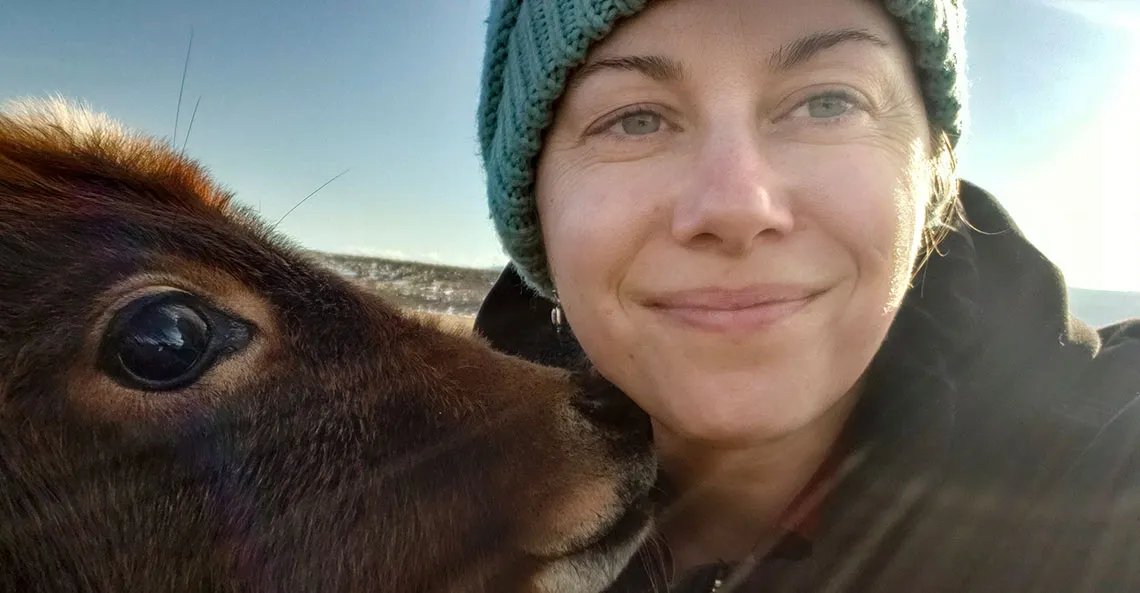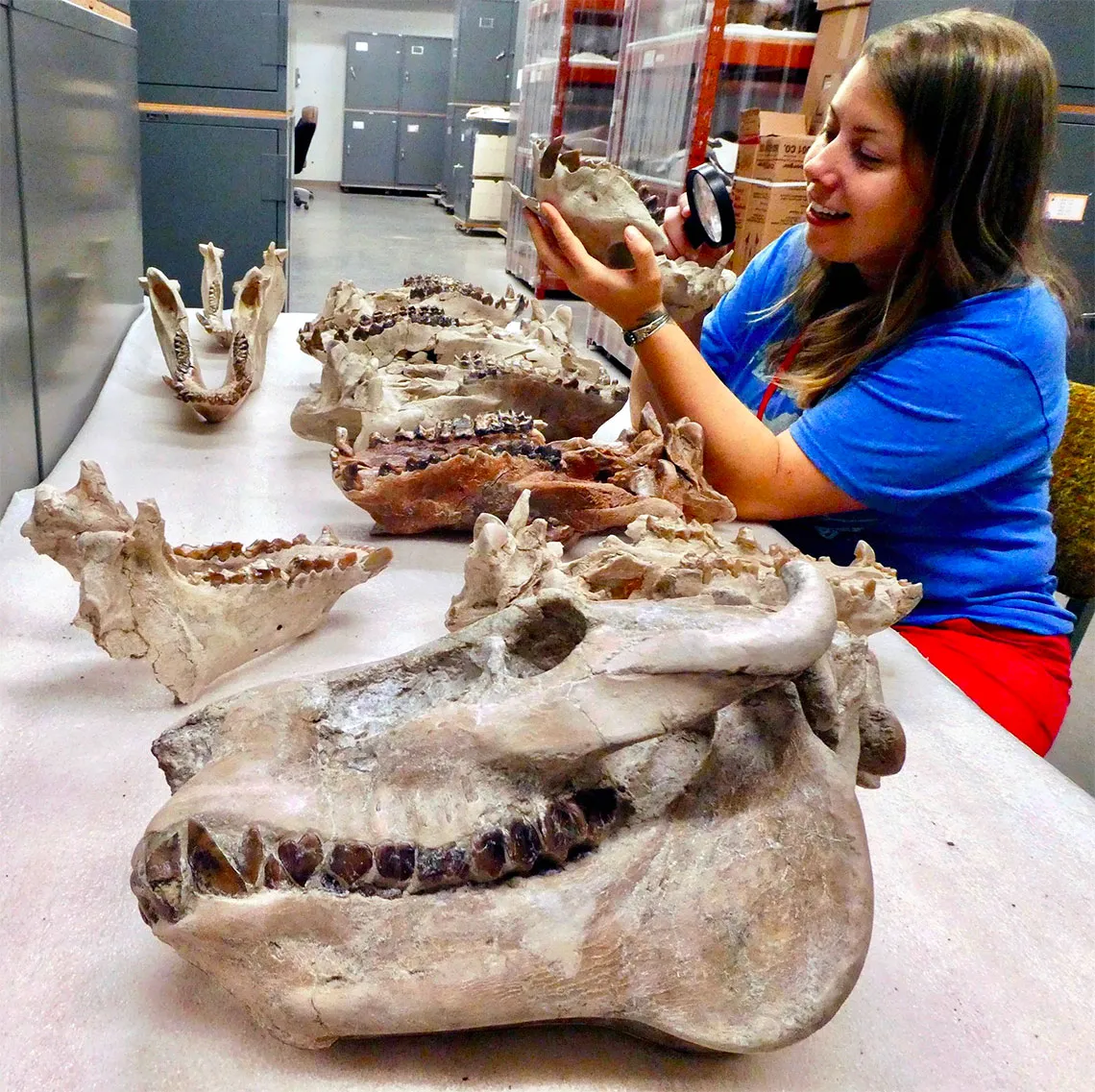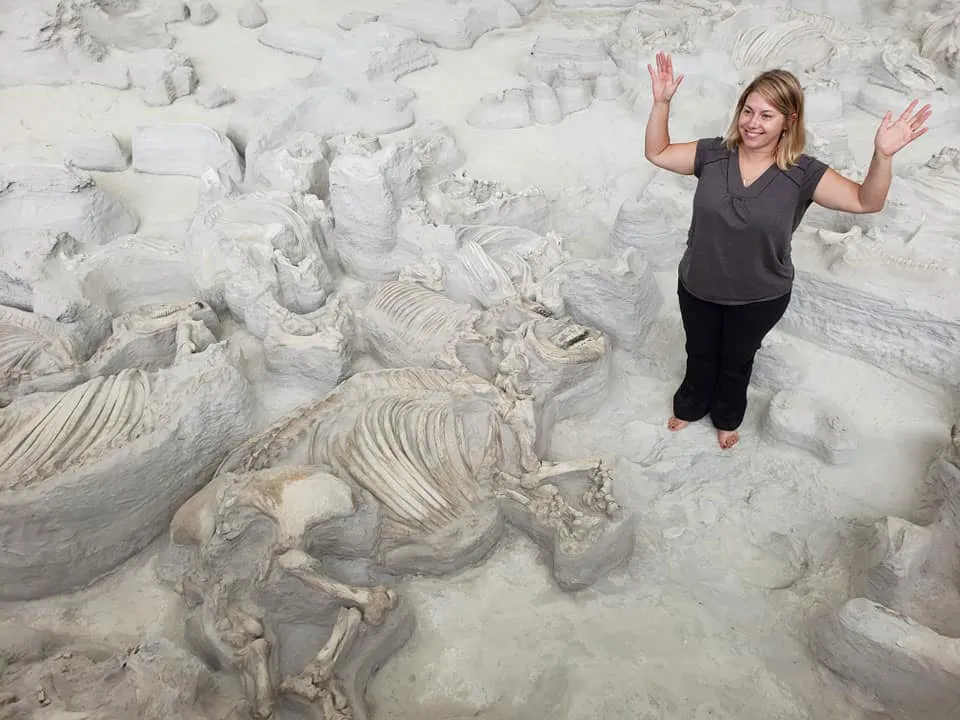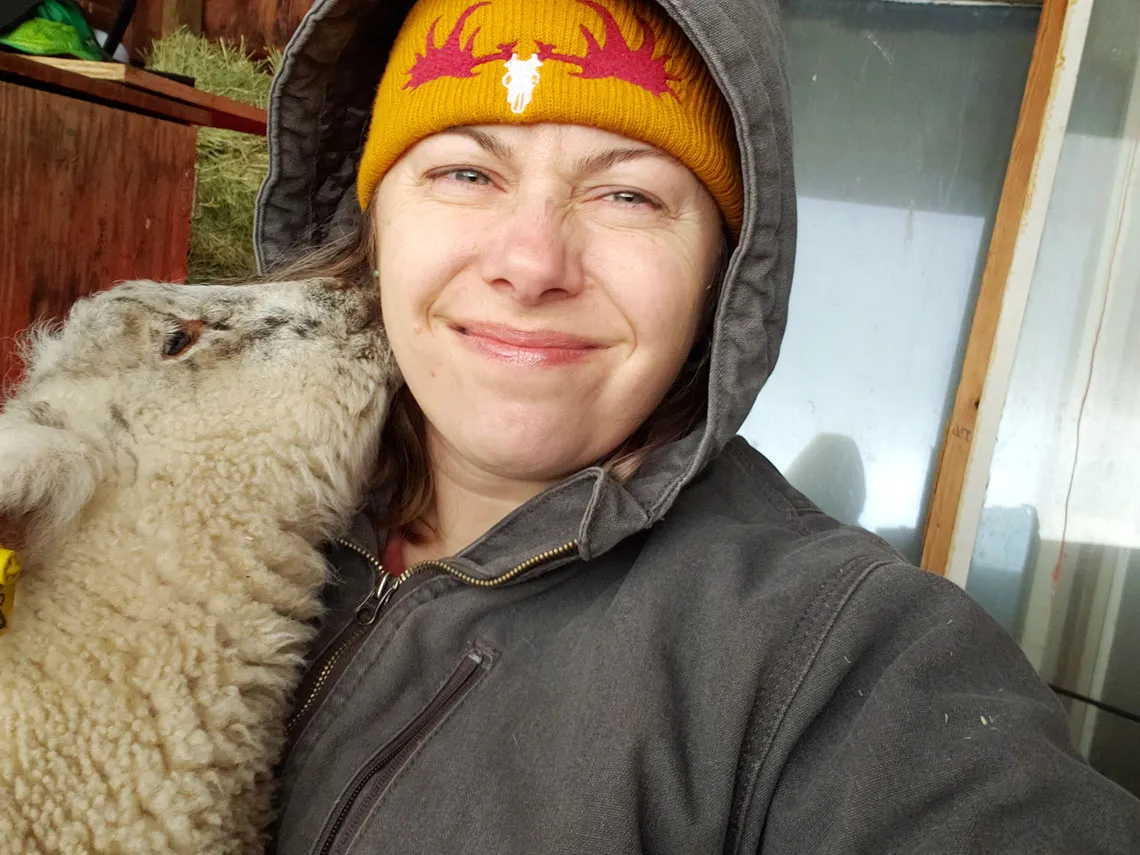T-rex in the Classroom: 9 Questions with Meaghan Wetherell, Assistant Professor of Practice
iSCHOOL FACULTY PROFILE

College of Information Science Assistant Professor of Practice Meaghan Wetherell with one of her mini cows.
If you take a course from me I can guarantee you're going to learn a lot more about dinosaurs than you might have expected—because really, what lesson plan isn't improved by adding in examples about T-rex?
Dr. Meaghan Wetherell, who joined the College of Information Science in 2020, teaches undergraduate and master's online courses in data visualization and analysis, science information and presentation, and serious STEM games. Based in central Washington, she earned her PhD in Geosciences from the University of Oregon and is an award-winning paleontologist and freelance science writer.
What brought you to the College of Information Science?
I came to the College of Information Science because I was excited to teach courses that integrated science communication and statistics in a department that was so interdisciplinary. Previously I worked at Central Washington University in their geology department. I still live in Ellensburg, Washington, and work remotely as we are trying to finish building our wooden roundhouse before we can move!
What is your current research, and what most excites you about this work?
I am a paleontologist who loves mammals, particularly weird ones with hooves and trunks. I like questions about adaptation and extinction, and am fascinated by the idea that certain evolutionary processes may have led to animals being stuck in “dead ends” that they couldn't survive.
I also do a lot of work with archeologists, biologists and other paleontologists with age-depth modelling (figuring out how old their dirt is while spending as little money on radiocarbon dates as possible). I often work with them once the data is already collected, so getting to puzzle through different collection practices and areas with different geologic problems is really fascinating.
I recently received a grant in collaboration with Rebecca Terry from Oregon State University: The Small Mammals of the Paisley and Connley Caves: Disentangling Drivers of Diversity in Pleistocene Extinction Survivors. In addition to helping with the age-depth modelling stuff, a big chunk of the $100,000 grant is going towards the development of an educational video game to showcase some of the geology + paleontology + archeology research that's happened in the Fort Rock Basin area of Oregon over the last 40 years or so. Players will be able to piece together clues and reconstruct what it looked like during the Pleistocene. I've hired four of our undergraduate Bachelor of Science in Game Design and Development students and we've begun digging into the design this semester, with the goal of a prototype by the end of Spring.
Tell us about your other information and data science work outside of the classroom.
I am a freelance science writer for PBS Eons and History of Humankind (though most of those episodes have not aired). I have a list of my Eons episodes on YouTube.
My most popular one is about Megalodon. It has 24 million views and trended above a Cardi B music video for about 30 minutes, which is maybe going to be the biggest accomplishment of my life.
(I've been a joint honoree for a Webby three times for work at PBS Eons.)
I do occasionally do paleontology consulting contracts. I did one this summer for the BLM and we found a brand new, 15 million-year-old fossil site that I'll hopefully come back and excavate next summer. Lots of rhinos and horses!

Dr. Meaghan Wetherell at the Museum of the Rockies, continuing her research on the oreodonts of Montana. Oreodonts are a group of extinct mammals that roamed North America for the majority of the Cenozoic, 40-5 million years ago. These ancient mammals are close relatives of sheep, pigs, and camels, but have no direct descendants alive today. This species of oreodont had very large cheekbones. These cheekbones are commonly covered in bite marks, healing breaks and infection, possibly from fights with other oreodonts. Photo courtesy Museum of the Rockies.
What are you teaching, and what do you most enjoy about teaching?
This semester I am teaching INFO 526 Data Visualization and Analysis and ESOC 478/INFO 578 Science Information and its Presentation. Next semester I will teach INFO 526 again and a new games course, Serious STEM Games.
I'm an online teacher, which can be challenging to make engaging. So I think for me, the most enjoyable part about teaching is finding new and interesting ways to deliver information and seeing how those sorts of adjustments make a difference in student learning. I also really like to create products in the classroom that can be used outside of it, like SciCommbat.com which is a hypertext myth-busting game my students and I create as a class in 478/578 each semester.
How do you bring your research and practice into your teaching?
If you take a course from me I can guarantee you're going to learn a lot more about dinosaurs than you might have expected—because really, what lesson plan isn't improved by adding in examples about T-rex?

Meaghan Wetherell at the Ashfall Fossil Beds in Nebraska during the filming of the National Geographic documentary X-Ray Earth.
How else do you engage with students to foster their professional growth?
I mentor capstone students on their projects and resume development, and I also occasionally do research credits with students who are interested in pursuing research careers.
Beyond your academic pursuits, what are your passions?
I like animals and I have enough of them to qualify as a small zoo. Three mini cows, six sheep, nine chickens, two dogs, two cats, and a thousand uninvited paper wasps that insist on resuming residency every fall. I have tried to milk my cows and make cheese but I can report only extremely minimal success: Did it technically qualify as a cheese? Sure! Was it good? No comment.
I also enjoy artwork and painting, and my virtual office is also my art room, so students see an ever-changing kaleidoscope of paintings as the semester progresses.

Meaghan Wetherell enjoys a kiss from one of her sheep.
What advice do you have for prospective and current InfoSci students?
Don't just practice your coding and research skills in class. Join the Game Dev Club, participate in hackathons, do research projects with faculty—those are the sorts of experiences that really solidify your abilities and make you better prepared for the job market.
What does the InfoSci experience mean to you?
College of Information Sciences like the College of Information Science are exceptionally diverse programs. I'm pleased to be a part of a college that hosts librarians, database experts, machine learning specialists and also a weird number of paleontologists all at the same time. That degree of intersecting research is incredibly unique.
Learn more about Meaghan Wetherell on her faculty page, or explore ways you can support the dynamic faculty of the College of Information Science and their research and teaching.

